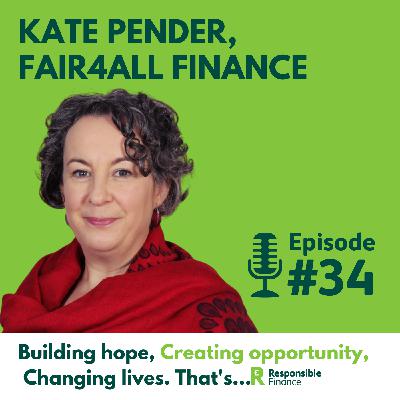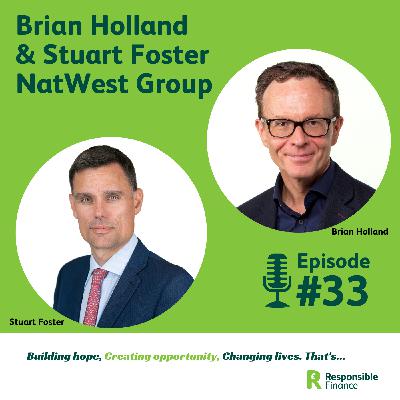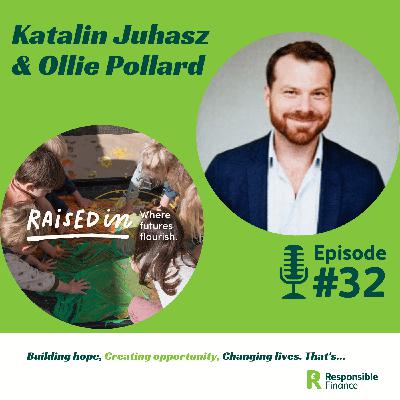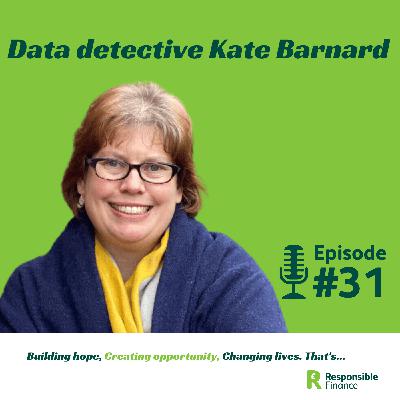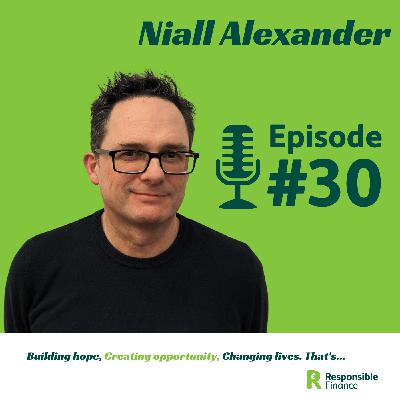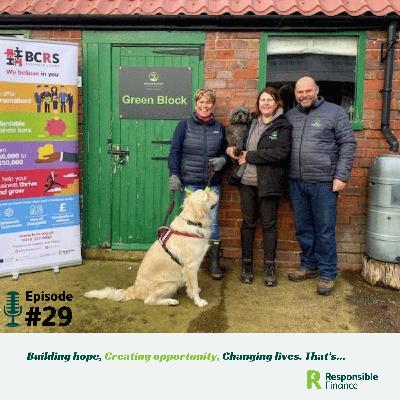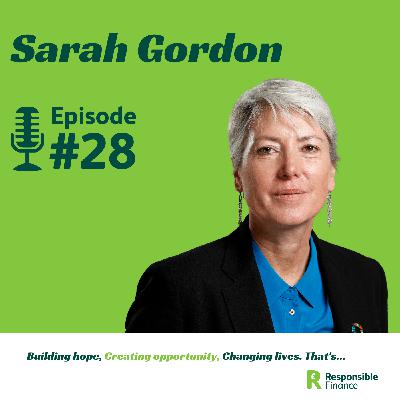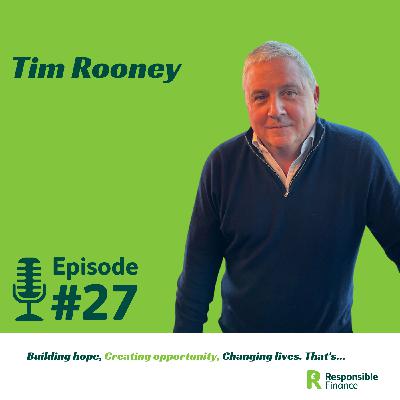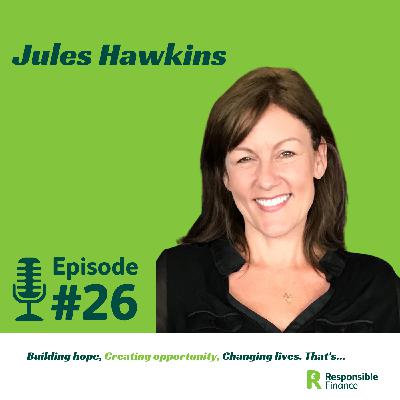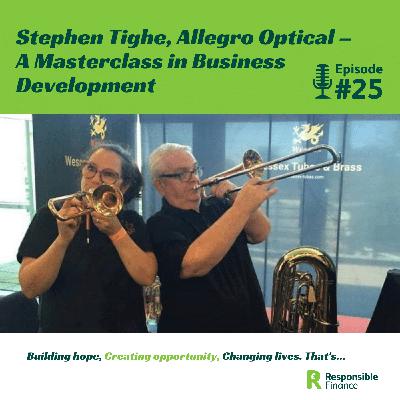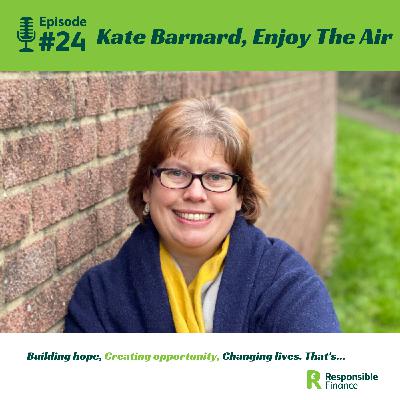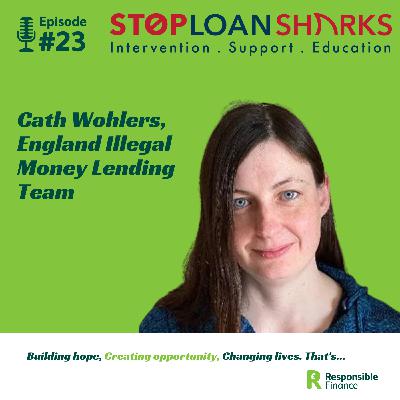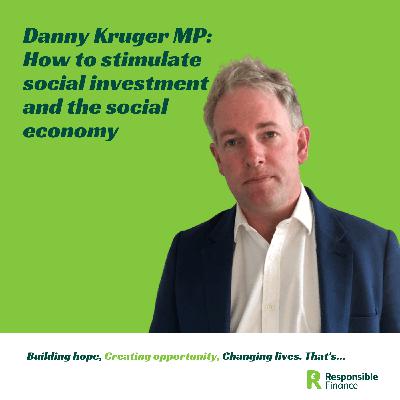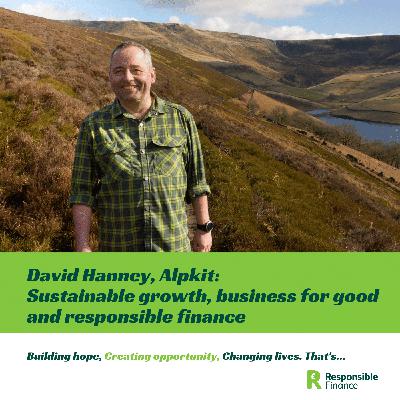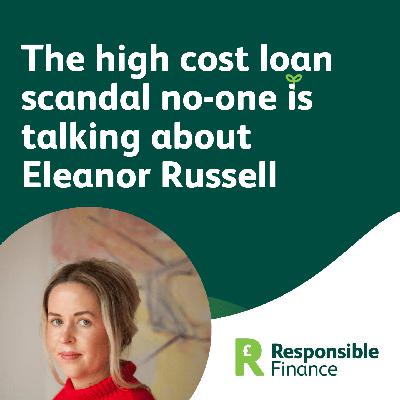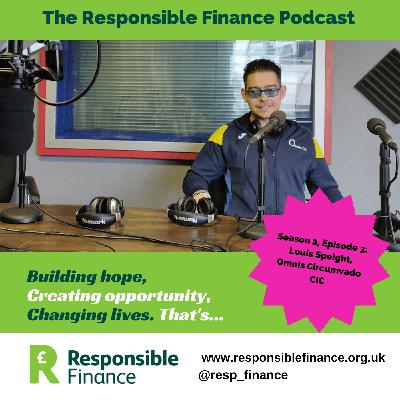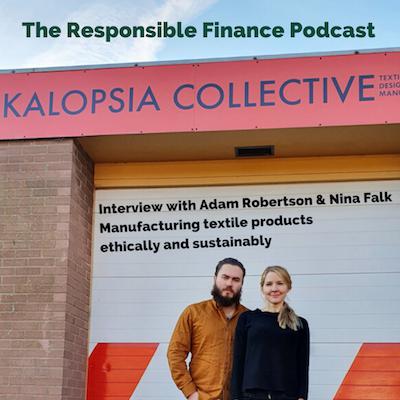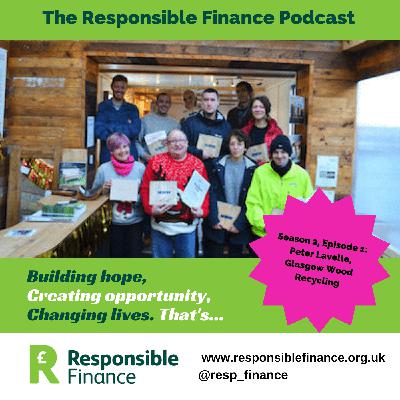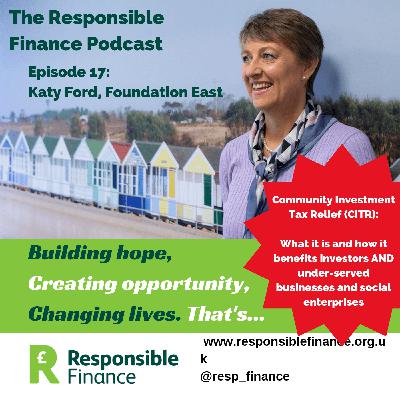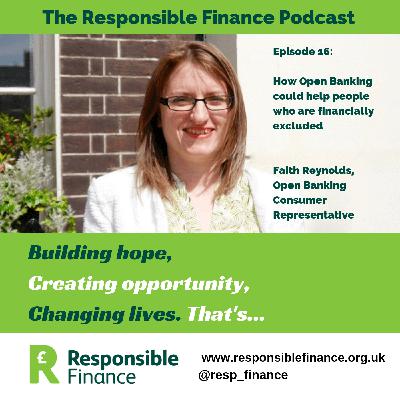Discover The Responsible Finance Podcast
The Responsible Finance Podcast

The Responsible Finance Podcast
Author: Jamie Veitch
Subscribed: 11Played: 531Subscribe
Share
© Responsible Finance and Jamie Veitch 2018
Description
From banks that can’t lend to small businesses, predatory payday lenders, high interest loan sharks, or social investors who just don’t support social enterprises - there’s plenty to criticise in the world of finance.
But there’s a a strong and growing network of finance providers who are building resilient economies throughout the UK – offering a personal service, a supportive approach and a real alternative to traditional bank lenders and finance providers.
Responsible Finance providers bring social and economic benefits to people, places and businesses.
And on the responsible finance podcast, we hear about how they build hope, create opportunity and change lives – that’s responsible finance.
But there’s a a strong and growing network of finance providers who are building resilient economies throughout the UK – offering a personal service, a supportive approach and a real alternative to traditional bank lenders and finance providers.
Responsible Finance providers bring social and economic benefits to people, places and businesses.
And on the responsible finance podcast, we hear about how they build hope, create opportunity and change lives – that’s responsible finance.
35 Episodes
Reverse
Kate Pender is CEO of Fair4All Finance, an organisation launched to improve the financial services sector so it better serves people who are underserved and excluded. She was appointed chief executive in 2024 having worked with Fair4All since its inception in 2019: "I drank the Kool-Aid and got hooked on the work." Kate is also a member of the Government's financial inclusion committee. She describes Fair4All's evolving work and covers: • three highlights of its research in 2024 with fascinating implications about the potential to support social purpose lenders via sustained subsidy and about testing different types of guarantee • advocacy for community development finance institutions (CDFIs) and supporting innovation • the No Interest Loans Scheme pilot • using guarantees to lever additional capital • the importance of "hearts and minds" stories to enable co-investment and partnership • the scale of the addressable market, customer journeys and "green shoots" on referrals from the banking sector to CDFIs • the need for regulatory clarity to catalyse concerted change across financial services • how Fair4All balances impact and risk tolerance when investing in organisations which support underserved people • Kate's career before Fair4All, including supporting small businesses to grow • the challenges Fair4All has faced as a young organisation • tips for anyone taking up a CEO role as an internal candidate • the potential impact of a National Financial Inclusion Strategy • how Fair4All will continue to support CDFIs and credit unions and its key priorities for 2025 We interviewed Kate in December 2024 for this podcast, published in January 2025. What next? • More about Fair4AllFinance: https://fair4allfinance.org.uk • More about Responsible Finance and our member CDFIs: https://responsiblefinance.org.uk
Why did NatWest Group choose to work with community development finance institutions (CDFIs) as part of its cost-of-living support package? What can be done to signpost CDFIs to bank customers who are financially vulnerable? How do bank to CDFI referral processes work for businesses and social enterprises? And why are CDFIs such a "terrific part of the overall ecosystem of financial services" whose ability is both celebrated and championed by NatWest Group? Brian Holland heads up NatWest Group's approach to vulnerable customers and leads on consumer duty and remediation. He is joined by Stuart Foster who looks after financial institutions across NatWest, and served on the Better Society Capital board for over six years. NatWest Group has supported and worked with Community Development Finance Institutions for over three decades; it was a founding funder and partner to Responsible Finance, formerly the Community Development Finance Association. We learn more about the nature of this work and long-term support, and discuss the impact of the 2023 NatWest Group and Responsible Finance Hardship Grant programme. Brian and Stuart also discuss: investment into the CDFI sector and conditions which could further enable this why a record-breaking year of CDFI lending is so significant for communities, businesses and people This episode was recorded in May 2024, shortly before NatWest Group hosted the launch of Responsible Finance's new Impact Report at an event addressed by CDFI customers and Bim Afolami, Economic Secretary to the Treasury. The event was attended by social investors and banks, business and social enterprise representative organisations, financial inclusion campaigners, and politicians across parties. Read the new impact report: https://responsiblefinance.org.uk/policy-research/impactreport/
Katalin Juhasz and Ollie Pollard join us today to show how impact alignment between investors and social enterprises makes a difference to communities and businesses – plus what traditional city institutions can learn from social investors. Ollie is Head of Enterprise Growth Funds at Resonance, founded in 2002 with the mission to connect capital to social enterprise. It had around £350m under management (and a team of 60) when we recorded this podcast. Katalin is Head of Future Business and Impact at Raised In, a social enterprise nursery based in Bristol. I noticed that before joining Resonance, Ollie had worked in the City of London for a decade and then on a Sri Lankan tea plantation for 18 months. So we picked his brains about how that experience changed his perspective – and what city investors can learn from social investors. We also discuss how the push towards impact investing has affected Resonance, the effect of accolades such as winning Property Investment Company of the year, and a new Resonance Enterprise Investment Fund. This new fund will provide patient, flexible, risk bearing and accessible investment finance to growth-stage social enterprises. Ollie tells us more. Then we hear from Katalin and if your assumptions about how a social enterprise nursery operates were similar to mine then you must listen to this. She describes how Raised In generates social impact and community benefit – and how its model means it can attract and retain talented staff. Raised In has previously secured two investments to grow, from Resonance. Katalin tells us what it needed the finance for (it created LOTS of new jobs, and has enabled 100 families to access nurseries they would not have been able to) and why it worked with Resonance. We hear about pre- and post-investment support and the "local multiplier effect" – Raised In helped sustain many local businesses because of its investment. Katalin Juhasz and Ollie Pollard join us today to show how impact alignment between investors and social enterprises makes a difference to communities and businesses – plus what traditional city institutions can learn from social investors. Ollie is Head of Enterprise Growth Funds at Resonance, founded in 2002 with the mission to connect capital to social enterprise. It had around £350m under management (and a team of 60) when we recorded this podcast. Katalin is Head of Future Business and Impact at Raised In, a social enterprise nursery based in Bristol. I noticed that before joining Resonance, Ollie had worked in the City of London for a decade and then on a Sri Lankan tea plantation for 18 months. So we picked his brains about how that experience changed his perspective – and what city investors can learn from social investors. We also discuss how the push towards impact investing has affected Resonance, the effect of accolades such as winning Property Investment Company of the year, and a new Resonance Enterprise Investment Fund. This new fund will provide patient, flexible, risk bearing and accessible investment finance to growth-stage social enterprises. Ollie tells us more. Then we hear from Katalin and if your assumptions about how a social enterprise nursery operates were similar to mine then you must listen to this. She describes how Raised In generates social impact and community benefit – and how its model means it can attract and retain talented staff. Raised In has previously secured two investments to grow, from Resonance. Katalin tells us what it needed the finance for (it created LOTS of new jobs, and has enabled 100 families to access nurseries they would not have been able to) and why it worked with Resonance. We hear about pre- and post-investment support and the "local multiplier effect" – Raised In helped sustain many local businesses because of its investment. Katalin Juhasz and Ollie Pollard join us today to show how impact alignment between investors and social enterprises makes a difference to communities and businesses – plus what traditional city institutions can learn from social investors. Ollie is Head of Enterprise Growth Funds at Resonance, founded in 2002 with the mission to connect capital to social enterprise. It had around £350m under management (and a team of 60) when we recorded this podcast. Katalin is Head of Future Business and Impact at Raised In, a social enterprise nursery based in Bristol. I noticed that before joining Resonance, Ollie had worked in the City of London for a decade and then on a Sri Lankan tea plantation for 18 months. So we picked his brains about how that experience changed his perspective – and what city investors can learn from social investors. We also discuss how the push towards impact investing has affected Resonance, the effect of accolades such as winning Property Investment Company of the year, and a new Resonance Enterprise Investment Fund. This new fund will provide patient, flexible, risk bearing and accessible investment finance to growth-stage social enterprises. Ollie tells us more. Then we hear from Katalin and if your assumptions about how a social enterprise nursery operates were similar to mine then you must listen to this. She describes how Raised In generates social impact and community benefit – and how its model means it can attract and retain talented staff. Raised In has previously secured two investments to grow, from Resonance. Katalin tells us what it needed the finance for (it created LOTS of new jobs, and has enabled 100 families to access nurseries they would not have been able to) and why it worked with Resonance. We hear what pre- and post-investment support means in practice and the "local multiplier effect" – Raised In helped sustain many local businesses because of its investment. What next? Resonance: https://resonance.ltd.uk Raised In: https://www.raisedin.org.uk Responsible Finance https://responsiblefinance.org.uk
Low emissions zones became a political battleground just after recording this interview with Kate Barnard, founder and CEO of Enjoy The Air. But what does the public think? Can we prove the impact of "hard or soft" interventions on air quality? And just how far are people prepared to go when it comes to action in response to poor air quality? "I was astounded" says Kate as she reveals the results of research showing just how many people will – if they have the means to – vote with their feet and move out of places with poor air. Which cities are most at risk? Kate explains. Despite a legal requirement on local authorities to document and provide evidence of their air quality it is surprising how many don't, Kate says. Though some are exemplary: she tells us which, why, and what we can learn. Kate spent two decades in a corporate career with Rolls Royce before launching her business, an "evidence based air quality intelligence company," which is now nearly three years old. This is a return visit to the Responsible Finance podcast for Kate and covers a huge amount of new ground. She discusses corporate and startup culture and what funders, financial backers and corporates can do better to support the UK's startup ecosystem. Plus plenty on the staggering results of public polling about air quality and how to communicate the reasons (and the "what's in it for me?") for Low Emissions Zones (anyone involved in policy research should listen to this). Kate also covers the development of Enjoy the Air's HALO air quality certification (funded by SWIG Finance and the British Business Bank), and how we can improve air quality for the most vulnerable. What next? More about Enjoy the Air https://enjoytheair.earth/ More about SWIG Finance https://www.swigfinance.co.uk/ More about Responsible Finance https://responsiblefinance.org.uk/
A community banking agreement brokered by a disadvantaged community with a mainstream bank two decades ago offers valuable insights to address financial exclusion today. Niall Alexander, a "community worker by trade" says the "groundswell" in addressing unfairness and financial exclusion is now reaching a peak. People "aren't asking for gold plated taps" – they need very small sums of money, but could turn to illegal lenders if fair and affordable credit isn't available legally. Niall, now Markets and Consumer Insights Manager with Fair4All Finance, covers a lot of ground in this episode and doesn't mince his words. A couple of decades ago he worked in Wester Hailes, a peripheral housing estate in Edinburgh. With some "amazing community activists" they set up a community banking agreement with the Bank of Scotland. What did it achieve for disadvantaged, under-served and financially-excluded people? How has Niall's journey from community worker to bank employee to working with community development finance institutions, then Carnegie UK informed his work with Fair4All Finance? What are his key priorities with Fair4All? Niall describes the recent powerful report into illegal money lending and other forthcoming research due in September 2023. Why is Niall a fan of good, fit-for-purpose legislation. What can we do to help people avoid illegal lenders and scale up affordable credit? How has Michael Sheen's engagement in addressing high-cost lending been helpful? Why should we, and how can we, quantify the value and benefit of the wraparound services that not for profit lenders offer? And what potential does a Community Reinvestment Act – or Fair Banking Act – offer in the UK? Many people work really hard to run really good businesses with wafer thin margins in community finance. And there are good people in mainstream finance who want to find common ground – despite different cultures – and Niall is confident in the potential for a "slow then sudden" change. What next? Visit the Fair4All Finance website for reports mentioned in this episode https://fair4allfinance.org.uk Read about the report from Fair4All Finance and We Fight Fraud ‘As one door closes – Experiences of illegal moneylending during an emerging cost of living crisis’ Listen to our podcast episode with Michael Sheen Learn more about Fair Finance, Fair for You, Moneyline, Salad Money and Responsible Finance, which represents social purpose, community lenders in the UK: https://responsiblefinance.org.uk
Caz and Darron Burness already had a thriving business – doggy day care, pet-sitting, home boarding and other services – when they spotted an opportunity to purchase a kennels premises. It was the perfect fit. But how to finance the acquisition? A £100,000 loan from BCRS Business Loans unlocked their ambition and growth plans, safeguarded several jobs and has enabled them to create new jobs too. Beacon Barkers is a licensed kennels with onsite groomers and shop. Caz and Darron also offer dogwalking and pet transport and have embarked on an exciting programme to develop the kennels, launch additional services, provide volunteering and training opportunities and create more jobs. Caz spent 23 years at TK Maxx, the fashion retailer. "I had many different jobs but always had a passion to be outside." She describes how she made the leap from employee to entrepreneur, why she and Darron approached BCRS Business Loans, their exciting plans to develop and expand the business expansion and what they have learned about buying and growing a business. "There are good finance companies and there are not so good finance companies," says Caz. "Don't think the only people who can lend you money are a bank. Please shop around." She also explains how BCRS' support beyond the money has helped Beacon Barkers to thrive. What next? Visit Beacon Barkers Kennels and Pet Centre: https://beaconbarkers.co.uk/ More about BCRS Business Loans at https://bcrs.org.uk/ More about community development finance institutions (CDFIs) at https://responsiblefinance.org.uk
Impact investing has moved into the mainstream. Many asset owners and managers are trying to deliver more positive social and environmental impact as well as a financial return. Yet just a few years ago many institutions were dismissive or sceptical. How did this change? "It's not about telling people what they should do, it's demonstrating what can be done and the power of the possible," says Sarah Gordon, the founding chief executive of the Impact Investing Institute which she ran from 2019 until recently. The Institute has found personal engagement alongside practical tools and case studies particularly effective. How else has it moved impact investing into the mainstream, and how has it performed against its four key objectives? Why must we accelerate our ambitions and how can we do so? Is fiduciary duty a barrier or obstacle to impact investing? How can we scale up place-based investing – and why are community voices as crucial as social and environmental benefit? What has the Institute learned from from community development finance institutions and what can they learn from the Institute's experience? This comprehensive conversation with Sarah Gordon also covers financing the just transition to Net Zero, practical steps individuals can take, the vital role of the media, and Sarah's next two projects, which will be located within the Grantham Research Institute on Climate Change and the Environment, a research institute at the London School of Economics. This is a packed episode with much to reflect on, learn from and put in to practice. What next? Visit the Impact Investing Institute where you can access case studies along with blueprints, guidance and tools to catalyse more impact investing: https://www.impactinvest.org.uk/ More about community development finance institutions (CDFIs) at https://responsiblefinance.org.uk
Ready for some big numbers? How about £165 million? Just one of the staggering figures revealed in Salad Money's first ever impact report. Salad CEO Tim Rooney tells us how the social enterprise, which lends to NHS and Public Sector workers, has helped applicants identify £165m in benefits they could apply for but were not claiming. Its customers "spend to and not beyond their means," he says, "but when they are faced with a financial hurdle, they typically will turn to credit and that's when we are there." It has saved them at least £5.2m in interest, according to its new report. He covers multiple parts of Salad Money's social impact. 4 in 10 borrowers have had a county court judgment (CCJ) in the past, but these are "not necessarily a barrier" because of the firm's 'More Than Your Score' ethos – "we've never used credit bureaux (credit reference agencies) to make decisions about affordable and appropriate lending." So how does it do it? Tim explains how Open Banking powers its affordability assessments and can unlock multiple other benefits for applicants – he's excited about the potential to help more people get broadband and utilities social tariffs they are eligible for. The report includes calls for action which would build financial inclusion and help the millions of people excluded from credit. Tim gives details. Salad has developed its own machine learning tools to analyse the four to six thousand data points it gets per applicant. Tim describes how these help it understand the inflationary and other pressures consumers are under. "We're attuned to using the data to help us make decisions. It's not a machine making a decision, it's a machine helping our team to make the best decisions for borrowers." The report has multiple other metrics and maps Salad's impact against an ESG (Environmental, Social and Governance) framework and specific UN Sustainable Development Goals (SDGs) such as gender equality too. Impact Investors, Tim says, are now waking up to the social impact that Salad and other CDFIs (community development finance institutions) and social purpose finance providers unlock. What next? Read Salad Money's impact report: https://www.saladmoney.co.uk/news/salad-money-2021-2022-impact-report Salad Money is a Responsible Finance member: https://www.findingfinance.org.uk
This is both an extraordinary and, sadly, an every day tale. All over the UK people with children or caring responsibilities compete for shifts or work patterns which fit around them, face the 'poverty premium' or are locked out from opportunities. "I was dismissed on so many levels," says Jules Hawkins. "I knew I was capable of more and I knew I wanted to be a taxpayer." Jules' "whole world crumbled" when a new owner of a business she'd long worked for refused to allow her to work flexibly around childcare. Everything escalated out of control: she had to move to lower-paid work, lost her home, her credit score was destroyed and Jules was hit by "everyone charging me more for everything." There are so many ironies in Jules' story and this interview illustrates how housing and childcare policies let many people down. But ultimately Jules approached Purple Shoots at a point where she was hugely vulnerable and describes how "they quite literally saved my life." Jules runs her own businesses now, including the pregnancy bed cushion she designed herself and a business network for single mums. She's repaid her Purple Shoots loan and even pledges a percentage of her sales to support the organisation to help others. She has lots to say in this interview about childcare, minimum income floors, entrepreneurship, marketing and business development. And she spills the beans on what she said to Rishi Sunak this summer. What next? Jules is director of KIH Products Ltd – https://kihproducts.wordpress.com/ and founder of The Single Mums Business Network, "a Business Network, with a Social Conscience" – https://singlemumsbusinessnetwork.com Purple Shoots – https://purpleshoots.org Purple Shoots is a member of Responsible Finance. More about Responsible Finance providers: https://www.findingfinance.org.uk
Stephen Tighe and Sheryl Doe founded Allegro Opticians to address specific issues which the eyesight of musicians and performing artists. The business now has customers from all over the world, has won multiple business awards, has a trusted high street presence with three branches, and has grown from two to more than twenty employees. Stephen describes his career background in the armed forces and financial services, how he and Sheryl met because of their passion for music, the problems which affect musicians' eyesight, building an ethical supply chain, and why they approached Responsible Finance member, Business Enterprise Fund (a not for profit social enterprise) for finance to grow the business. It's a thoughtful interview about finding a niche, outperforming cheaper 'chain' competitors, the value of exemplary customer service, how to get the right finance, and why it's important to give back. A masterclass in business development. What next? Allegro Optical's website: https://allegrooptical.co.uk Business Enterprise Fund: https://www.befund.org Business Enterprise Fund is a member of Responsible Finance, representing a network of "community finance" providers which support businesses, social enterprises and people. Check out https://www.findingfinance.org.uk/
Air pollution contributes to around 40,000 deaths a year in the UK and more in many other parts of the world. Enjoy The Air helps cities achieve air quality standards through policy, infrastucture and behaviour change. CEO and founder Kate Barnard, an engineer, describes why she launched the business and how viewing cities as engineering systems means it can help local authorities and other organisations develop appropriate "clear air" strategies with measurable results. Enjoy The Air secured support from Responsible Finance provider, SWIG Finance, so it could create a robust and internationally recognised certification for cities which meet WHO (World Health Organisation) air standards. Kate explains how Enjoy The Air catalyses behaviour and policy changes, why she approached SWIG Finance and the impact of doing so, who the business is already working with and the importance of "WIIFM" or "What's in it for me?" What next? Enjoy The Air's website: https://enjoytheair.earth/ SWIG Finance: https://www.swigfinance.co.uk/ SWIG Finance is a member of Responsible Finance, representing a network of "community finance" providers which support businesses, social enterprises and people. Check out https://www.findingfinance.org.uk/
"They make it feel like it's your fault," says Cath Wohlers about loan sharks. They use manipulation, isolation and coercive control and ruin lives. Earlier this year a Centre for Social Justice report estimated 1.08 million people in England alone are currently using illegal moneylenders, who prey on financially vulnerable people. Cath is LIAISE Manager for the England Illegal Money Lending Team. Sharks aren't always easy to recognise. Two thirds of people who the team supported last year thought they were borrowing from a friend, not a loan shark. She explains the Team's activities during national Stop Loan Sharks Week, and its work 24/7 all year around on prevention, investigation, prosecutions, seizing sharks' assets, and helping people avoid and escape sharks. And she describes the simple things you can and should do to help. Listen to this important episode to find out. What next? Read our article, The sharks’ feeding frenzy and how to starve them Read this FT article from late 2021 which covered how CDFIs help people avoid loan sharks. Read Iona Bain’s article in the i newspaper which explains that illegal moneylenders come in many guises and are embracing social media to ensnare people.
Danny Kruger MP answers questions from Responsible Finance CEO, Theodora Hadjimichael: How can Government stimulate a boom in the social economy? Danny has described the role of social enterprises in “fixing broken markets” – what does he mean by broken markets? How can social enterprises address them? Banks and tech companies invest heavily in CDFIs (community development finance institutions) in the USA. How can we unlock more investment from tech and corporates into the UK's CDFIs and the communities they serve? What role can tax regimes and tax reliefs play in stimulating social investment? How can the UK's social lending sector persuade Government to help it scale-up? This interview took place as a live webinar in May 2021.
Can business be a force for good? Definitely, according David Hanney, CEO of Alpkit, a business and certified B Corp which designs and sources outdoor clothing, camping equipment, bikes and other gear. Alpkit sells direct-to-consumers through its website and its stores in the UK. It now has more than 100 employees – 6 years ago there were just 12. It’s a great business in many ways, as David explains, with a set of six sustainability principles informing how it operates (and central to how it does business). Alpkit must be commercially viable to exist. Alongside this, it knows it has a responsibility to its staff, suppliers, customers, the environment and the communities it operates in to be a good citizen. It's growth has been supported by a responsible finance provider and David explains why and how it secured finance, what the process was, and how it now banks with the mainstream bank which actually referred it to a community development finance institution (CDFI). He also talks through the accreditation process for becoming a B Corp and Alpkit's scores, how Alpkit ran a crowdfunding campaign which was fully subscribed in just minutes, and how in the next 5 years the most innovative and commercially successful products will be sustainable products. We recorded this interview with David in Spring 2021. Since then Alpkit’s sustainable growth has continued, with new stores in Edinburgh, Betws y Coed, and Ilkley on top of its shops in Ambleside, Hathersage, Keswick, the Metrocentre. It is about to open in Bristol. What next? Alpkit's website Its Six Sustainability Principles and 2021 Sustainability Report Our member, First Enterprise - Enterprise Loans, has worked with thousands of start-ups and growing businesses (like Alpkit) to help them follow their dreams and achieve their goals.
“The only gig in town came with 60% interest, because we were considered subprime lending. It meant that every payment of £15,000 included £9,000 interest.” Business owner David, who subsequently saved more than £80,000 in interest a year by refinancing with a CDFI. When it comes to high-cost credit, most of us think of personal borrowing and payday loans. But the quote above comes from a business owner. More than a decade after the Financial Conduct Authority (FCA) took over regulating consumer lending and introduced the cap on payday loans, there’s a new high-cost loan story unfolding. Up to one in four loan enquiries to Community Development Finance Institutions (CDFIs) now come from small businesses seeking to escape unsustainable high-cost loans. It rarely makes headlines, but it is leaving some firms fighting to survive. In this episode Eleanor Russell, Policy and Research Manager at Responsible Finance, describes the high-cost business loans crisis. A community development finance institution (CDFI), SWIG Finance, was able to refinance the business owner quoted above, saving his firm £80,000 to £90,000 of interest a year. Eleanor has more jaw-dropping statistics and describes what banks and government can do so that more businesses become aware of ethical, responsible lending options through CDFIs, earlier.
Imagine yourself on a zero-hours contract, leaving home early in the morning to deliver a sports therapy session. By the time you've spent several hours travelling to the place which booked the session - at your own expense - it's been cancelled. And you don't get paid. Now imagine making that journey in a wheelchair. Carrying a heavy bag in your teeth. And imagine when the session is not cancelled and you do deliver it, your transformative work is valued by participants, but not by your employer. Frustrations like these led Louis Speight, a former European-record-holder in the 800 metre T33 Wheelchair Sprint, and a colleague to launch their own social enterprise, Omnis Circumvado CIC. In this interview Louis describes: the profound impact sport made in his life, how Omnis works with children and young people in SEN (Special Educational Needs) schools and with elderly people in day centres, why “the house will set on fire,” when launching a social enterprise. succession planning and whether business growth is the right thing to do. why Omnis worked with Key Fund, a responsible finance provider, and how this helped the organisation. And much more.
In one of the worst-offending industries for landfill and modern slavery, Kalopsia proves you can make products more ethically and minimise environmental impact. A batch manufacturer of textiles, apparel and accessories, Kalopsia is a social enterprise which started as an artistic collective and morphed into a textile producing community interest company. It makes exciting products (including for brands you will have heard of), supports the textile industry and the people in it, minimises waste and environmental impact. And it demonstrates all of this is possible as a sustainable (in all ways) business. In this episode, Adam Robertson and Nina Falk of Kalopsia CIC describe: Kalopsia's journey from running galleries and exhibitions to batch manufacturer how Kalopsia has learned from other industries to develop highly efficient processes and systems what batch manufacturing means why their customers work with Kalopsia making the user experience on the website as easy as possible the importance of design and branding the impact of being a finalist in the 2018/19 Social Enterprise of the Year category in the Citi Microentrepreneurship Awards – and of winning the Manufacturer of the Year Award at The Scottish Business Insider "Made in Scotland Awards" why Kalopsia worked with responsible finance provider, DSL Business Finance their plans for the year ahead the widespread misinformation about ethics and sustainability in fashion and textiles - with a key call to scrutinise claims you see.
Glasgow Wood Recycling transforms reclaimed wood which could otherwise be wasted into high quality furniture and products. The social enterprise and charity, launched in 2006, follows the Community Wood Recycling model. It has made furniture from reclaimed timber for a diverse range of customers from the public to hotels, boutique wedding venues, retail outlets, and schools. The business has prevented over four thousand of tonnes of wood from being wasted, has provided exceptional training to hundreds of people and has 19 employees and 45 volunteers. In this episode, Peter Lavelle covers engaging and looking after volunteers, securing appropriate customers, staying true to your values, winning the Citi Microentreprenuership Award for Sustainability and working with a responsible finance provider.
Want to invest in an organisation supporting under-served businesses and disadvantaged communities - and be rewarded with an attractive tax relief for doing so? Community Investment Tax Relief is the answer, according to Katy Ford, chief executive of Foundation East. Foundation East lends to and supports small businesses unable to access mainstream finance. Their CITR Investors can receive up to 25% tax relief spread over 5 years - and unlock affordable finance for businesses which would otherwise be unable to access it. In this episode, Katy gives examples of the businesses which are now thriving thanks to a loan and support from Foundation East; describes how CITR works (and how Foundation East has attracted investment); and gives her views on how responsible finance providers should innovate and collaborate. Here are the full timings: 1:40 Foundation East is a Community Development Finance Institution, also known as a "responsible finance" provider. It lends to small businesses unable to access mainstream finance. 2:20 Why does Katy do the job she does? 3:15 Katy was brought up on Guernsey and became more and more aware of the divide between "the haves and the have-nots." 5:25 Examples of small businesses, unable to access mainstream finance, which have borrowed from Foundation East. 10:31 Why now is an especially interesting time for Foundation East. 11:10 Foundation East is a mutual society with a legal structure as a “bencom” - society for community benefit. It can sell shares in the mutual society; those funds are used to invest in (lend to) small businesses. Foundation East offers 2 types of shares including Community Investment Tax Relief (CITR) shares. 11:40 What is Community Investment Tax Relief? How does it work? 12:30 What are the challenges when talking with potential investors, or potential advisors to investors? 13:25 Comparisons with EIS and SEIS schemes. 14:10 The minimum and maximum investment levels for CITR investments into Foundation East. 15:30 Whatever level of investment a member makes they get one vote. 16:30 The difference between withdrawal and transferable shares. 17:30 Foundation East’s shares were launched on Ethex at the end of March 2019. 18:45 How Foundation East is reaching out to potential investors. 19:45 “It’s up to us as a sector to push this tax relief.” How is Foundation East working with other Responsible Finance providers? 22:08 CDFIs have great stories and can evidence the work they do has enormous impact on people’s lives: jobs created, wellbeing improved, and more. 24:20 The misunderstanding that any business which cannot access money from a mainstream source is completely wrong says Katy. Yet sadly some accountants and advisors - and some in Government - still have this perception. This is why the Responsible Finance sector is essential. 26:00 Foundation East has already attracted over £200,000 via the CITR share offer. Where’s the money mainly coming from? And has there been a particularly effective route to market? 29:20 How Katy believe responsible finance providers must innovate and collaborate. 31:15 further examples of businesses and social enterprises supported and enabled by Foundation East. 33:50 How to get in touch with Foundation East
What is Open Banking and how can it help people who are financially vulnerable and financially excluded, including people who are unbanked? How can Open Banking benefit businesses, social enterprises and the self-employed? How will Open Banking help Responsible Finance providers (and credit unions) – and what should they be doing and thinking about? And is there a danger that Open Banking might facilitate discrimination against people who are already financially vulnerable? Faith Reynolds is the Open Banking Consumer Representative. She’s part of a steering group responsible for delivering the technology that underpins the Open Banking initiative. Faith joins us in the latest episode of the Responsible Finance podcast to answer these questions and more.


